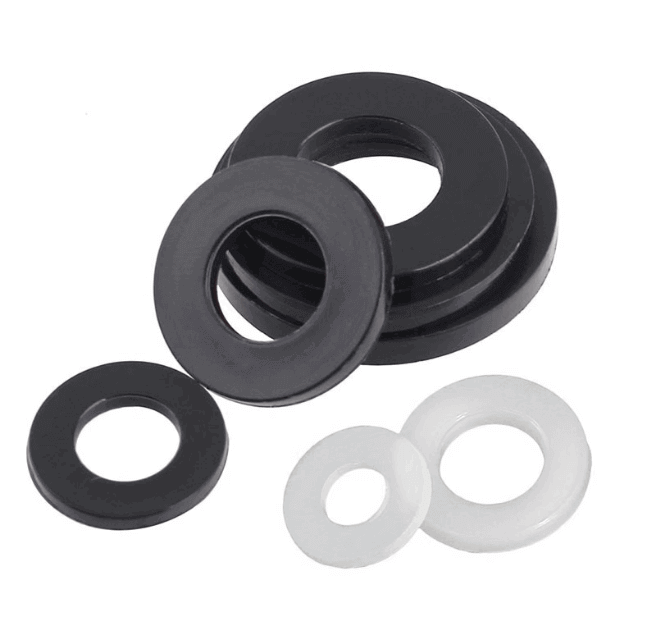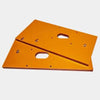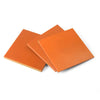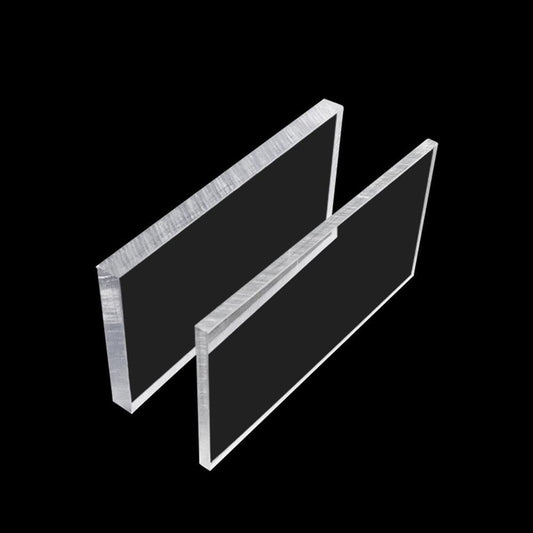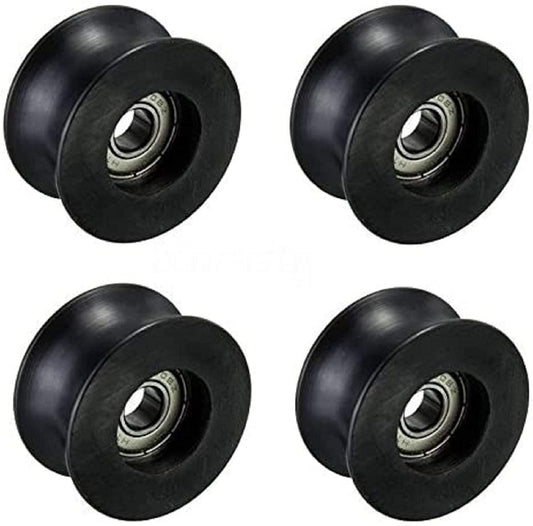Why Nylon is the Future of Mechanical Applications
Nylon is a highly versatile engineering material that plays an important role in various industrial and mechanical applications. Its high tensile strength, excellent wear resistance, and ease of machinability make it an ideal choice for demanding environments. Among the different forms of nylon, Nylon Blocks have become essential components in a wide range of mechanical systems due to their adaptability and performance. They are used in everything from automotive parts to heavy machinery and can be customized for specialized uses, offering a highly efficient solution to many engineering challenges.

🎉🎉🎉Limited Time Offer Use code: QR4GNY08SHVR at checkout and enjoy a special discount on your entire order! 👉 Nylon plastic
Similarly, Cast Nylon has gained popularity, particularly for customized manufacturing, where its dimensional stability and cost-effectiveness make it suitable for specialized needs. Cast nylon is produced through a casting process, allowing for larger and more complex shapes, which makes it especially beneficial in applications that demand precision and consistency. The adaptability of cast nylon makes it an excellent material for fabricating custom gears, rollers, and various industrial components that need to meet stringent tolerances.
What are Nylon Blocks?
Nylon Blocks are solid pieces of nylon that can be further processed or machined for specific industrial applications. Their key properties include exceptional durability, abrasion resistance, and machinability, making them ideal for producing custom components such as bushings, bearings, gears, and structural supports. Nylon blocks are commonly used in environments that require materials capable of handling heavy loads while reducing friction, such as conveyor systems, mechanical transmissions, and heavy machinery.
The versatility of nylon blocks also extends to their ability to perform well in extreme environments, including exposure to high temperatures and corrosive chemicals. Their resilience makes them a popular choice for use in automotive and manufacturing industries, where components must endure rigorous operational conditions without compromising their integrity.
The key properties of nylon blocks include:
-
Durability: Nylon blocks are highly resistant to wear and can withstand heavy loads, making them reliable components in mechanical assemblies.
-
Chemical Resistance: They are resistant to many chemicals, which makes them suitable for challenging environments such as chemical processing plants and food manufacturing facilities.
-
Machinability: CNC Machined Nylon Components can be easily produced from nylon blocks, allowing for custom shapes and high precision. This machinability makes them a favorite for parts that require intricate designs and tight tolerances.
Cast Nylon: Properties and Advantages
Cast Nylon is a type of nylon produced through a casting process that allows for larger and more complex shapes compared to extruded nylon. This process results in superior dimensional stability, making cast nylon suitable for applications that require tight tolerances. Additionally, cast nylon has a higher molecular weight, contributing to improved wear resistance and load-bearing capabilities.
The casting process also allows for the creation of nylon parts with fewer internal stresses, which contributes to their dimensional stability and enhances their performance in dynamic applications. The versatility and durability of cast nylon make it particularly useful for applications such as gears, pulleys, rollers, and other high-stress components.
Benefits of using Cast Nylon in manufacturing:
-
Cost-Effectiveness: Cast nylon is ideal for producing large, custom parts at a lower cost compared to metal alternatives. Its ability to be cast into complex shapes reduces the need for additional machining, saving time and resources.
-
Superior Dimensional Stability: Its consistency and precision make it perfect for parts that need to maintain exact dimensions over time, especially in environments with fluctuating temperatures and loads.
-
Versatile Applications: Cast nylon is used for producing gears, rollers, and other mechanical parts required in heavy-duty equipment, as well as in industries such as marine, automotive, and food processing.

Nylon 6 vs. Nylon Blocks: Understanding the Differences
Nylon 6 is another popular nylon type that differs significantly from Nylon Blocks in terms of production methods and properties. While Nylon 6 provides excellent strength and chemical resistance, nylon blocks offer greater versatility for applications that require machining and custom fabrication.
-
Nylon 6: Known for its flexibility and general-purpose use, Nylon 6 is commonly used in textiles, injection molding, and as a base material in various products. It is favored for its high impact resistance and flexibility, making it suitable for products that require a balance of strength and pliability.
-
Nylon Blocks: Primarily used for mechanical applications, nylon blocks can be precisely machined into custom shapes, providing superior performance in industrial environments. Their rigidity and strength make them particularly suited for applications where stability and load-bearing capacity are critical.
When choosing between these types of nylon, consider:
-
Strength Requirements: Nylon 6 is suitable for lighter applications, while nylon blocks offer the robustness needed for demanding mechanical parts, such as gears and pulleys that must endure continuous wear.
-
Customization Needs: For projects requiring precise machining, Custom Nylon Machining using nylon blocks is the preferred option, as they can be easily modified to meet specific requirements without compromising on structural integrity.
Custom Nylon Machining for Industrial Needs
Custom Nylon Machining is crucial for adapting Nylon Blocks to meet specific industrial needs. Advanced CNC machining processes are used to create precise, high-quality components from nylon blocks that meet the exact specifications of a project. CNC machining is particularly effective for producing components such as bushings, washers, and gears—all of which benefit from nylon's strength and low-friction properties.
Custom nylon machining offers the ability to create complex geometries and intricate designs that are essential for specialized industrial applications. Nylon's machinability allows for quick turnaround times on custom parts, making it a preferred material for industries that require rapid prototyping and scalable production.
Common machining processes for Nylon Blocks include:
-
CNC Milling and Turning: These processes provide accuracy and consistency, even for complex shapes. CNC milling and turning can achieve tight tolerances, which is essential for ensuring the reliability and performance of critical components.
-
Drilling and Cutting: Nylon blocks can be customized into smaller components suited to various mechanical applications. These processes are used to produce components such as spacers, flanges, and fittings, which are integral to the functioning of larger mechanical systems.
The flexibility offered by CNC machining makes nylon an attractive choice for a wide range of industries, including automotive, heavy machinery, and general manufacturing. Nylon's low coefficient of friction and resistance to abrasion make it suitable for components that require smooth operation and long-term reliability.

Nylon Gears Manufacturing
Nylon is widely used in gear manufacturing, with both Nylon Blocks and Cast Nylon being popular choices for this purpose. Nylon gears are often preferred over metal gears in many applications due to their lightweight nature, noise reduction capabilities, and excellent wear resistance.
Advantages of nylon gears:
-
Noise Reduction: Nylon gears generate significantly less noise compared to metal gears, making them ideal for consumer appliances and machinery where noise control is important. This quality is particularly beneficial in environments where reducing operational noise is a priority, such as in office equipment or household appliances.
-
Enhanced Durability: Cast Nylon and Nylon Blocks are both highly resistant to wear, ensuring a longer lifespan for gears used in mechanical systems. Nylon's inherent lubricity also reduces the need for external lubrication, which simplifies maintenance and enhances the gear's longevity.
Nylon gears are particularly beneficial in conveyor systems, automation equipment, and industrial machinery where reduced noise and enhanced durability are critical. Their ability to handle high loads without significant deformation makes them suitable for heavy-duty applications where reliability and performance are essential.
Nylon Blocks in Mechanical Transmission Parts
Nylon Blocks play a vital role in Mechanical Transmission Parts, providing numerous advantages over traditional metal components. Due to their reduced friction, low weight, and ease of replacement, nylon parts help improve the overall efficiency of mechanical systems.
Nylon components are particularly advantageous in reducing wear on mating parts, which extends the lifespan of the entire mechanical system. Their lightweight nature also reduces the overall load on the system, making it more energy-efficient.
Benefits of using nylon in transmission parts:
-
Reduced Friction: Nylon components reduce energy loss due to friction, contributing to greater mechanical efficiency. This property is especially useful in high-speed applications where minimizing energy loss is crucial for optimal performance.
-
Longer Lifespan: The wear resistance of nylon means that parts need to be replaced less frequently, resulting in long-term cost savings. Nylon's ability to absorb shock and vibrations further enhances its durability, making it ideal for applications where mechanical parts are subjected to repetitive stress.
-
Ease of Replacement: Nylon parts are easier to machine and replace, making them ideal for systems that require regular maintenance. The ease of handling nylon components also reduces downtime during maintenance, contributing to improved productivity.
Examples of components that benefit from nylon include bushings, bearings, and sliding components used in heavy machinery and conveyor systems. These components help maintain smooth operation, reduce downtime, and enhance the overall reliability of mechanical systems.

CNC Machined Nylon Components for Mechanical Applications
Precision is crucial when producing CNC Machined Nylon Components. CNC machining allows for the creation of complex, highly accurate nylon parts that meet the stringent requirements of mechanical and industrial applications. The ability to produce parts with exact dimensions ensures that nylon components can seamlessly integrate into larger systems and perform reliably under demanding conditions.
Examples of CNC machined nylon components in real-world applications include:
-
Automotive Components: Nylon blocks and gears are used in automotive assemblies, providing noise reduction and durability. They are found in applications such as timing gears, seat belt components, and under-the-hood parts that require resistance to high temperatures and chemicals.
-
Heavy Machinery Parts: Custom nylon bushings and bearings offer strength while maintaining a lightweight structure. These components are used in equipment such as excavators, cranes, and industrial presses, where the reduction of moving part weight can significantly improve efficiency and performance.
By using CNC machining, nylon components can be produced with exact specifications, allowing them to function effectively in harsh environments and high-demand applications. The precision of CNC machining also ensures that parts fit perfectly, reducing wear and tear and extending the life of both the nylon components and the machinery they are used in.
Why Nylon Should Be Your Go-To Material
Nylon Blocks and Cast Nylon are fundamental components in numerous mechanical and industrial applications, providing versatility, durability, and customizability. Whether for gear manufacturing, mechanical transmission parts, or custom components, nylon delivers unmatched performance. The adaptability of nylon allows it to be used in a wide range of industries, from automotive and aerospace to food processing and heavy machinery.
Leveraging Custom Nylon Machining and CNC technologies ensures that industries can obtain high-precision, durable nylon parts tailored to their specific needs. With benefits such as reduced noise, longer lifespan, and ease of maintenance, nylon is an invaluable material that helps enhance the efficiency and reliability of mechanical systems.
Elevate Your Mechanical Systems with Nylon
"Interested in learning more about how nylon can improve your mechanical applications? Contact us today for a custom consultation on nylon components! Our team of experts is ready to help you find the perfect nylon solution for your specific needs, ensuring that your systems perform at their best with durable and efficient components."

🎉🎉🎉Limited Time Offer Use code: QR4GNY08SHVR at checkout and enjoy a special discount on your entire order! 👉 Nylon plastic

